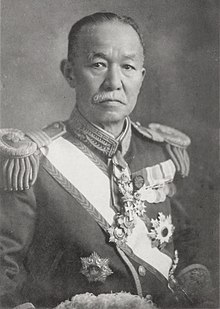The Kenjirō
Den Kenjirō ( Japanese : 田健 治郎 ; * March 25, 1855 in the Tamba Province , today: Hyōgo Prefecture ; † November 16, 1930 in Ebara-gun , Tokyo Prefecture ) was an administrative officer and politician of the Rikken Seiyūkai in the Japanese Empire , who several times Minister and Governor General of Taiwan between 1919 and 1923 .
Life
Administrative officer and member of the Reichstag
Den Kenjirō, son of the village chief Bunpei Den, was a judicial officer and then a police officer after moving to Tokyo in 1874. He was chief of police in the prefectures of Kōchi , Aichi , Kanagawa and, most recently, the prefecture of Saitama . In 1890 he entered the Ministry of Communications (Teishin-shō) as an administrative officer and became an employee of Minister Gotō Shōjirō . He later became Deputy Minister of Communications and, at the same time, Director General of the Ministry's Railway Department. He resigned from these offices in 1898 and switched to the private sector, where he was president of the Kansai Railway Company (Kanseitetsudō) . In 1900, however, he temporarily returned to the Ministry of Communications and was director of the Ministry's administrative department until 1901.
On August 12, 1901 Den was a member of the Shūgiin , the lower house of the Reichstag (Teikoku-gikai) , to which he belonged until December 28, 1902. He represented the party founded by Itō Hirobumi Friends of the Constitutional Government ( Rikken Seiyūkai ) , the leading party in Japan at that time. After leaving the Reichstag, he was chief secretary of the Ministry of Communications between August 1901 and January 1906. On January 7, 1906, he finally became a member of the Herrenhaus ( Kizokuin ) , the upper house of the Reichstag, and was a member of this until his death on November 16, 1930. At the same time he was raised as a baron (Danshaku) to the nobility ( Kazoku ) and was one of the leading politicians of the manor , along with Tosuke Hirata , Kiyoura Keigo , Ōura Kanetake and Yamagata Aritomo . As a leading politician of the Sawakai - Group he played a major role in the debate on the Siemens scandal in January 1914 one of the most spectacular political scandals of the late Meiji and Taisho period . It comprised secret armaments agreements between high-ranking members of the Imperial Japanese Navy and the European industrial groups Siemens and Vickers and led to the overthrow of Prime Minister Yamamoto Gonnohyōe's first cabinet on April 16, 1914.
Minister and Governor General of Taiwan
In the Terauchi cabinet , Den Kenjirō took over the office of Minister for Communication ( Teishin-shō ) on October 9, 1916 and held this until September 29, 1918. On October 29, 1919, he took over the post of Governor General of Taiwan as the successor to the late Lieutenant General Akashi Motojirō and held this office for almost four years until September 2, 1923, after which Uchida Kakichi succeeded him there.
The himself was after his return on September 2, 1923 in the cabinet of Yamamoto II Minister of Agriculture and Trade (Nōshōmu-shō) and held this ministerial office until his replacement by Okano Keijirō on December 24, 1923. At the same time, he acted between September 2 1923 and his replacement by Hiranuma Kiichirō on September 6, 1923 as Minister of Justice (Shihō-shō) . In 1926 he was appointed a member of the Privy Council ( Sūmitsu-in ) . After his death as a result of a cerebral hemorrhage on November 16, 1930, he was buried in the Tama Cemetery (Tama Reien) in Fuchū .
Web links
- Den Kenjirō in Portraits of Modern Japanese Historical Figures
Individual evidence
- ↑ Terauchi cabinet in The Governments of Japan 1885 - 1945
- ^ Taiwan: Japanese Governors-General in Rulers
- ^ Cabinet Yamamoto II in The Governments of Japan 1885 - 1945
| personal data | |
|---|---|
| SURNAME | Den, Kenjirō |
| ALTERNATIVE NAMES | 田健 治郎 (Japanese) |
| BRIEF DESCRIPTION | Japanese politician |
| DATE OF BIRTH | March 25, 1855 |
| PLACE OF BIRTH | Tamba Province , today: Hyogo Prefecture , Japanese Empire |
| DATE OF DEATH | November 16, 1930 |
| Place of death | Ebara-gun , Tokyo Prefecture |

